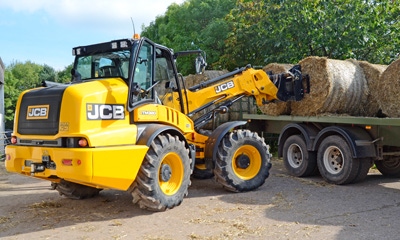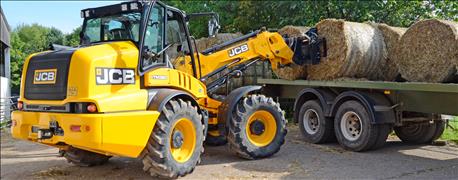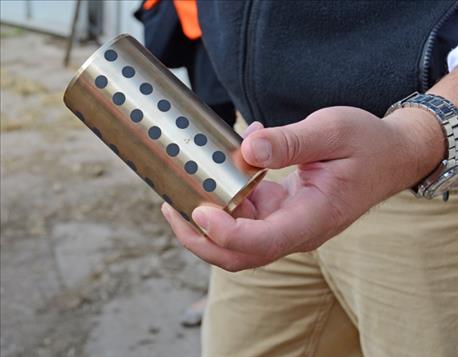
It is all about getting the right tool for the right job around the farm, according to Bruce Mustard, product manager at JCB North America.
Unlike the U.S., telehandlers are a common sight on farms in England. "In the U.S., they rely on tractors to move and handle commodities," Mustard says in front of a cow feed bunk at a JCB farm in Staffordshire, England. "Here, farmers use tractors in the row-crop fields and rely on telehandlers around the livestock farm."

HELP AROUND THE BARN: Telehandlers are a common sight on farmyards in England. JCB says U.S. farmers would find the TM320 useful around the livestock barn. It offers a heavy-duty loader with the reach of a telescopic handler.
With the availability of multiple attachments, telehandlers move and stack large round hay bales, load manure, and load feed wagons. Mustard says livestock producers will find the right machine for the job in the updated version of the TM320 articulated telescopic handler.
A few key features of this heavy-duty loader include:
• JCB EcoMax engine that meets U.S. final Tier 4 emissions without a diesel particulate filter (DPF)
• improved boom-extension cylinder end damping for smoother telescopic action
• electronically controlled and programmable reversible engine cooling fan
• high-performance LED lighting option for 360-degree illumination
• new instrument cluster, door release and in-cab storage
• block-tread tire option for yard work and road travel
JCB has been pioneering the telehandler concept since 1977.
Tim Burnhope, JCB's chief innovation and growth officer, says farmers will appreciate the central driving position and low boom height on the TM320. "It offers the all-around visibility of a wheel loader with the reach and lift versatility of a telescopic handler."

TIME-SAVER: The bronze graphite bearings on the JCB TM320 provide for up 500 hours of use without a need for greasing.
The JCB TM320 has a 6,390-pound lift capacity at full lift height of 17.1 feet from the ground level. It can lift 3,530 pounds at a full forward reach of 9.7 feet ahead of the front wheels.
It has a 124 hp EcoMax engine and six-speed power-shift transmission. With the push of a button on the joystick, the transmission can change from automatic to manual mode.
Time-saver
The TM320 has a new full-color instrument display. Daily checks for engine oil, coolant and washer fluid levels are now done from the driver's seat once the engine starts. "This saves time on machinery maintenance," Mustard adds. "Now, no matter who is driving the equipment — whether the farmer or a worker — routine checks are carried out."
Underneath the chassis is another time-saving measure. The new bronze graphite bearings are a dream for farmers who hate greasing the chassis pivot and boom. "This allows them to only grease every 500 hours," Mustard explains. "I think farmers will really like this aspect of the machine."
JCB also improved the visibility from the cab. Larger right-hand and rear quarter windows were installed. In addition, the right-hand door can now be propped open or folded fully back for access to fresh air.
Better traction
Farmers have a choice of tires with the JCB TM320. There are 24-inch traction-grip tires with 17- to 20-inch widths, or buyers have the new option of Michelin Bibload tires, which come in 18- and 20-inch widths. The Bibload tires work well for farmers traveling on roadways.
In addition to the size, Mustard also finds that JCB's block-tread design runs more smoothly on the road, with less noise and vibration heard and felt in the cab.
Burnhope says that with all of the improvements to the JCB TM320, farmers will find this latest model "even better than its predecessor."
About the Author(s)
You May Also Like






